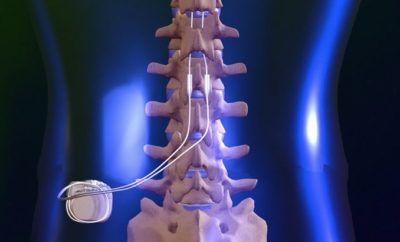
Health & Wellness
A Comprehensive Approach to Pain Medicine
By Dr. Fabian A. Ramos
Interventional pain medicine has significantly evolved during the last 20 years to become a sophisticated medical option in the treatment of chronic pain. It has the best outcomes when combined with other modalities of treatment such as physical therapy, clinical hypnotherapy, behavioral therapy and weight loss. This multi-disciplinary and multi-modality comprehensive approach exemplifies what chronic pain medicine should strive to be.
Comprehensive pain centers can now offer minimally invasive procedures such as implantable spinal cord stimulators, intrathecal pain pumps for spasticity in pain, chemical destruction of nerves for abdominal cancer pain, physical destruction of nerves for uncommon facial pain, heat destruction of spinal nerves to treat arthritic spine pain, as well as injection of intraspinal medication. Intraspinal injections utilize a non-cutting needle to deliver anti-inflammatory medication.
Kyphoplasty/vertebroplasty is amongst the most rewarding and highly-rated patient satisfaction procedures. The stabilization of vertebral compression fractures is a technique which involves an injection of bone cement into the vertebra, filling a void in the collapsed vertebra which ultimately stabilizes the fracture, reliably alleviating pain in approximately 90% of patients and resulting in no scars.
A revolutionary procedure called targeted radiofrequency ablation (t-RFA) provides fast and durable pain relief for cancer patients suffering from painful metastatic spinal tumors. Destruction of metastatic cancer in the spinal column uses a radiofrequency wire, which produces heat, thus destroying the tumor by burning it. This procedure may take less than 60 minutes and is a palliative treatment that can be performed without changing a patient’s current cancer protocol before, during or after chemotherapy or radiation therapy. For those who are challenged with quantity of life, t-RFA can offer them a better quality of life.
Chronic pain can also be improved with non-invasive techniques such as physical therapy. Targeting physical therapy through a specific diagnosis will produce better and lasting results. Personalized rehabilitation programs can be strategically designed for each patient and will cater to their specific needs. Significant improvement in patient gait and balance impairments can be achieved while monitored through a computerized balance analysis platform. A variety of successful techniques, such as the Graston technique, can be used to break the cycle of chronic tendinopathy and the restrictive calcification to recover tendons from painful conditions.
Weight loss can be a prevalent and significant factor for patients experiencing chronic pain. Treating weight loss could be the single most efficient way to eliminate pain of intervertebral disc, knee and/or hip origin. This simple concept however, can be the most difficult. In most cases, the desire and willpower of the patient, as well as access to a guided food and fitness program is essential. Clinical hypnotherapy intervention in the form of 3-5 acute sessions can create lasting aversion to foods that are craved but not healthy. Hypnotherapy services can also expand to chronic pain control with a highly impressive success rate.
Chronic pain is often closely associated with depression and can dramatically deteriorate a patient’s quality of life. For this reason, in-house specialized behavioral health programs with licensed mental health professionals are ideal. Individual and group counseling sessions, as well as psychometric testing, diagnosis and monitoring can offer the best scenario for overall patient success.
The approach to medication management should always be very conservative. A committed pain medicine practice will focus on the many other modalities and interventions that can be utilized to lessen the intensity of a patient’s pain. The majority of pain patients should be managed without the usage of opioids, while maintaining the minority of the patient population with a low dosage. The main goal should always be to have an exit strategy from the opioid crisis that is plaguing our community.
Ramos Center for Interventional & Functional Pain Medicine is located at 100 3rd Ave. West; Suite #110; Bradenton, FL 34205 and 5741 Bee Ridge Rd.; Suite #550; Sarasota, FL, 34233. 941.08.9555, RamosCenter.com.




You must be logged in to post a comment Login